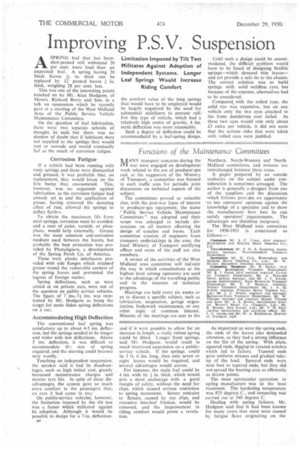Functions of the Maintenance Committees
Page 40

If you've noticed an error in this article please click here to report it so we can fix it.
UANY transport concerns during the 1V1 war were engaged on development work related to the use of producer-gas and, at the suggestion of the Ministry of Transport, a committee was formed in each traffic area for periodic joint discussions on technical aspects of the subject.
The committees proved so valuable that, with the post-war lapse of interest in producer-gas equipment, the name ." Public Service Vehicle Maintenance Committees" was adopted and their scope was enlarged to include, discussions on all matters affecting the design of coaches and buses. Each committee consists of engineers from transport undertakings in the area; the local Ministry of Transport certifying officer and some of his staff are also members.
A review of the activities of the West Midland area committee will ind'cate the way in which consultations at the highest level among operators are used to the advantage of the travelling public and in the interests ot technical progress.
Meetings are held every six weeks or so to discuss a specific subject, such as lubrication, suspension, garage organization, bodywork maintenance, or any other topic of common interest. Minutes of the meetings are sent to the Northern, North-Western and North Midland committees, and .minutes are interchanged between these areas.
A paper prepared by an outside authority on the subject under consideration is sometimes arranged. The author is generally a designer from one of the suppliers and the discussion which follows prov:des au opportunity -to test operators' opinions against the knowledge of a specialist and to show the manufacturer how best he can satisfy operators' requirements. The advantages are therefore reciprocal.
The West Midland area committee for 1950-1951 is constituted as follows:—
Chairmaus Mr. S. C. Vince, chit engineer. Blrminghans and Midland Motor Omnibus Cu,. Ltd.
Vice-chairman: M. E 0. A. Singleton, deputy general manager, Wolverhampton Tratiummi Dc pa reale M.
Secretariest Mr. G. Colt. Birmingham and Midland Motor Omnibus Co.. Ltd.: Mr W. Bireher. Shropshire Omnibus Association.
Committee Members: Mr. H Parker. ch et engineer. Birmingham Transport Department;
MT. 12.. I. Gates, Ch& . assistant engineer. Coli entrY Transport Department; Mr. A. Witcomb Smith, general manager, and Mr. 1. C. Elcock, garage superintenden,t West Bromwich Transport Department; Mr. F. F. Hund,ey, engineer, Walsall Transport Department: Mr. 1. A. G. 'Bowen, engineer, Potteries Motor Traction Co., Ltd.; Mr, J. C. Wager, engineer and manager, Burion-an-Trent Transport Department; Mr. W. Tllsione, manager and engineer, Messrs. Tilstone and Sons; Mt. A. E. Brown, maintenance director, Brown's Motor CD. CrlIfISILM, Ltd.; Mr. R. Bowdle, Don Everali, Ltd.; Mr. F. H. Paul, regional maintenance and certifying officer; Mr. L. C. Jacobs and Mr. W. A. Blenkinsop, Ministry of Transport staff,




















































































